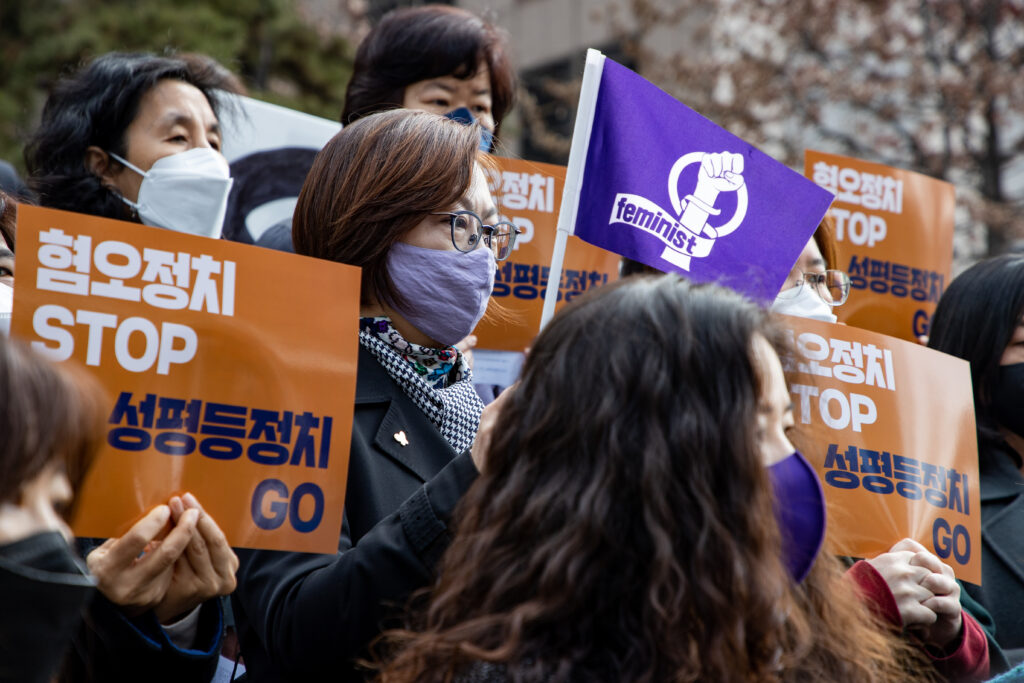Social discord seems to be the zeitgeist in South Korea, with the rise of ideological conflict over issues of gender equality and anti-feminist backlash often purported to be increasingly central to the country’s politics. But we must scrutinise the emerging cultural and ideological conflicts to distinguish substance from story.
A 2021 Ipsos poll found that 41 per cent of respondents in South Korea recognised cultural conflict, compared to the global average of 35 per cent. Gender conflict in particular has become a major point of contention. Compared to global trends, ideological polarisation among men and women in their 20s and 30s is the most severe in South Korea, with women increasingly identifying as liberal and men as conservative.
But systematic studies have found that, despite these self-identified inclinations, there is actually no meaningful difference in ideology or policy attitudes between genders. Young people seem to recognise that the gender war is a divisive framing that polarises politics, indicating that the media reproduces narratives that problematise basic issues of fairness by suggesting they are gender-oriented. A 2022 South Korean poll on gender awareness found that the majority of men and women were dissatisfied with the way youths were portrayed in politics and believed that politicians should stop instrumentalising gender.
For example, men’s complaints about women not having to complete military service have long inflamed gender relations. The system of awarding extra points on government job entrance exams to those who served was ruled unconstitutional in 1999 for discriminating against women and the disabled. Debate over whether military service is a form of gender inequality has been encouraged by the New Reform Party in the April 2024 general election. They promised to create legislation that required a military service record for employment in the police and firefighting forces.
South Korean media has overrepresented the discourse on gender-oriented ideological differences, employing a loose interpretation of data and anecdotes to highlight conflict. By framing the interests of men and women in an adversarial and zero-sum relationship, it creates a distorted representation of the actual evidence.
The current gender war in South Korea does not arise from ideological differences. The most important political discourses have traditionally been rooted in the economy and class. The politically motivated exacerbation of gender conflict is designed to allow power to alternate between political groups within a single elite class that is not actually particularly ideologically distinguishable.
A poll that examined the public perception of 14 different types of conflicts annually for 10 years found that while 29 per cent of respondents perceived gender conflict to be serious in 2013, this rose to 53.1 per cent in 2023. The perception of gender conflict has increasingly become more acute, but is still moderate compared to the perception of conflict arising from region (65.3 per cent), age (71.8 per cent) or class (77.9 per cent). It seems unlikely that gender will replace generation or class as the source of a major culture war.
This does not suggest that structural gender inequality or the increasing hostility between South Korean men and women are not serious. But it may not be necessary to gender the political interests and objectives of South Korean youths to this extent. Some experts attribute South Korea’s extremely low birth rate to the gender conflict. But many youths point to their economic instability, prioritisation of self-fulfilment and rejection of the traditional life plan as reasons for not dating, getting married and having children.
Other issues that currently represent gender conflict, such as military service and equal pay, are also ultimately about fair economic compensation and redistribution. Gender is easy to politicise because it is one of the most visible aspects of one’s sociopolitical identity. But focusing on a particular demographic characteristic skews policy perspectives and diverts attention from the more complex problems in South Korea’s social structure.
As increasing female political participation confronts the long history of patriarchy in the private and public spheres, more political issues may become gendered. Greater political inclusion and diversification of discourse are democratically ideal. But it is important to accurately identify the core political interests of a policy issue rather than presuming social division based on a single dimension of identity.
Even generational differences can partly be attributed to economic inequality and redistribution, as an aging population leads to conflict over the welfare budget and pension payments. Social conflict in South Korea is about the social safety net, redistribution and employment that allows people to enjoy a stable livelihood.
Exaggerating social divisions frays the social fabric by creating different ingroups and outgroups that do not share the same interests and do not deserve the same privileges. An exclusive and individualistic society makes it difficult for policymakers to draw on the social capital necessary to successfully implement policies.
Soyoung Kim is a PhD candidate at the S Rajaratnam School of International Studies, Nanyang Technological University, Singapore.


Gender divide in South Korea is often cited as a significant social issue, but research reports show little substantial ideological difference between men and women. The politicisation of gender conflict seems to overlook more prevalent sources of contention, such as class and economic dissatisfaction, while exacerbating perceived gender differences, potentially skewing policy perspectives and distracting from deeper systemic issues.